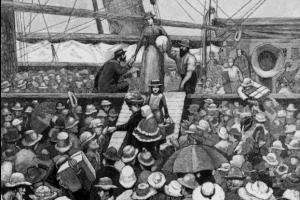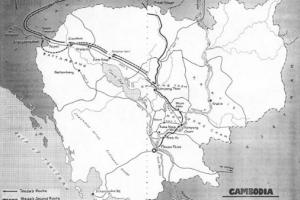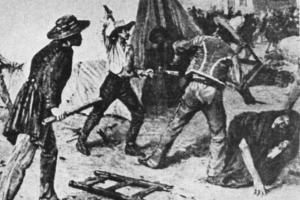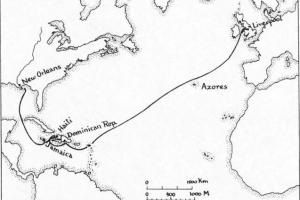
North American Immigrant Letters, Diaries, and Oral Histories provides a unique and personal view of what it meant to immigrate to America and Canada. With more than 100,000 pages of personal narratives, including letters, diaries, pamphlets, autobiographies, and oral histories, the collection provides a rich source for scholars in a wide range of disciplines. Much of the material is previously unpublished. Several thousand pages of Ellis Island Oral History interviews, indexed and searchable for the first time, are included, along with thousands of political cartoons. Never before have scholars been able to search these documents easily and find answers to complex questions with just a few clicks.
The materials begin around 1840 and extend to the present, focusing heavily on the period from 1890 to 1920. People from many countries are represented, including more recent waves of immigrants from Latin America and Asia. In selected cases, audio files will let users hear the actual voices of the immigrants, and facsimile images will show pages of their scrapbooks. With the help of Alexander Street’s award-winning Semantic Indexing, researchers can easily compare experiences across temporal and ethnic boundaries.
No other single resource presents such a broad, detailed, and immediate record of the experience of immigration, supporting research in history, sociology, ethnic and diversity studies, women’s studies, labor studies, and literature. Labor historians will benefit from details describing work in restaurants, meat packing plants, mines, railroads, and factories. Sociologists will find lengthy passages describing immigrant schooling, social life, domestic life, and community rituals. Students of literature will find descriptions of the events that inspired Upton Sinclair and Theodore Dreiser.
North American Immigrant Letters, Diaries, and Oral Histories provides perspectives both on North America and on the immigrants’ countries of origin. Users will find vivid descriptions of life under the Czar and the various revolutionary governments in Russia; tales of famine and poverty in Ireland; accounts of anti-Jewish pogroms in Eastern Europe; stories of persecution and fascism; and detailed descriptions of life in rural communities and towns as well as in major cities such as London, Berlin, and Moscow. Descriptions of initial encounters with soda pop, chewing gum, and bananas appear alongside reflections on labor conditions, political groups, and attitudes of the authorities.
Alexander Street's Semantic indexing
Unique methods of indexing provide a host of new ways to find, view, and analyze the material. As far as possible, information included for each author includes country of origin, family occupation in the native country, the reason for immigrating, date of immigration, whether the author repatriated or stayed in North America, the state and city of settlement, occupation in the new country, political affiliation, labor or occupational affiliation, and much more.
Additional subject headings make it possible to identify material dealing with family life, courtship and gender issues, experiences of discrimination, political persecution, and hundreds of other thesaurus terms newly created for this project.
Semantic Indexing allows the user easily to find answers to questions that otherwise are impossible to ask in an electronic database:
Content Types: comic strips, diaries and memoirs, editorial commentary, letters, oral histories, and more.
Topics: agriculture and farms, communities, domestic life, economics, employment, health, immigration and emigration, law, politics, religion, settlements, transportation and travel, and more.

Read through hundreds of transcribed interviews with immigrants who passed through Ellis Island in the early 20th century. These first-hand accounts describe what life was like for these immigrants in their country of origin, family history, reasons for emigration, their journey to New York, processing at Ellis Island, and adjustment to life in the United States.

Read Teeda Butt Mam's account of her family's experience fleeing Cambodia after the Khmer Rouge's takeover of Phnom Penh.

Read letters and diary entries of Chilean immigrants working as gold miners in California in the late 1840s.

In September and early October of 1889, Honoria Prendiville and Alicia Joseph Nolan made their way across the Atlantic on board the steamship Floridian. Nora and Alice's diaries record their adventures on an ocean path that took them on an unusual voyage through the West Indies and ending in New Orleans where they became Dominican Sisters.